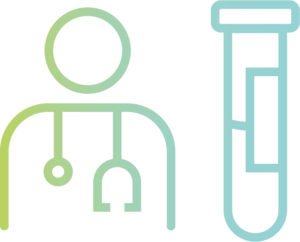If you are a women interested in ROCA Care, it is important you understand the journey in full.
The outline below describes what is involved. If you have any questions about our services, please contact our experienced team who will be happy to help.

Step 1: Contact us
The first step is to contact one of our verified clinicians who offers ROCA Care and will be able to share more details or book you in for an initial consultation.

Step 2: The initial consultation
At the consultation, your clinician will be able to assess if the ROCA Test is an appropriate option for you, and once you have agreed, you can sign the consent form. The clinician will take an initial blood sample, or alternatively can book you in for a later date.

Step 3: Testing your blood sample
Your blood sample will be sent away to the GENinCode approved laboratory, and the level of a cancer marker will be measured.

Step 4: Generating your ROCA risk of ovarian cancer
The results from the laboratory together with your age and menopausal status will then be used to generate your personal risk of having ovarian cancer. Your clinician will receive a report within 7 days.

Step 5: Next Steps
Based on the results of your ROCA Test your clinician is likely to recommend one of three options:
Normal: Your next test will be scheduled in 4 months.
Intermediate: A repeat ROCA Test should be scheduled in six weeks
Elevated: A repeat ROCA Test, with an ultrasound scan of your ovaries should be scheduled within six weeks
ROCA Care
ROCA Care is a comprehensive surveillance package using the ROCA Test, offered by expert clinicians, for women who have a confirmed mutation in the BRCA1 or BRCA2 gene.
Frequently Asked Questions
You may be eligible for the ROCA Test if you are between 35 and 83 years with a known alteration in the BRCA1 or BRCA2 genes. You should talk with your doctor about whether the test is right for you.
If one or more members of your family have had ovarian and/or breast cancer (including male breast cancer), you may wish to seek expert advice about your own risk of developing ovarian cancer. Expert clinicians will gather information from you about your family history, as well as other factors such as your age and ethnic background. The clinician may recommend that you have a BRCA test.
Removal of the ovaries and fallopian tubes is the recommended option for women with a BRCA gene alteration. The ROCA Test should only be considered as a short term option until a woman is ready to undertake surgery to remove her ovaries and fallopian tubes. We recommend you consult one of our expert clinicians if you wish to explore your options.

